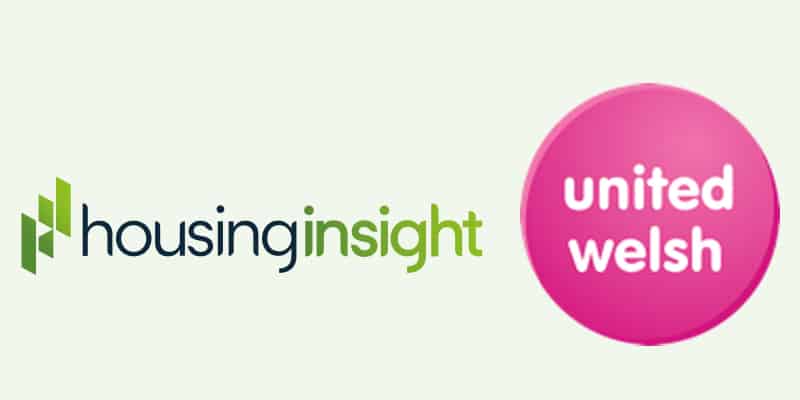United Welsh discusses how its partnership with Housing Insight has evolved over time in response to an emerging digital society and the needs of its growing organisation.
When we first began our digital journey with Housing Insight over six years ago, we were IT-driven not business-driven. Specifically, we wanted to find a tenant app that our customers could access through either a portal or an app – as a small team, we didn’t have the capacity to update each platform separately and we wanted a solution that would update both platforms at the same time.
Housing Insight originally developed a solution that met our needs after asking a raft of questions in order to understand what we wanted to achieve and where we wanted to go next. Keen to help us get ahead of the game, Housing Insight delivered a product that gave us exactly what we needed.
Connecting neighbourhoods
For a while that was sufficient but, two years later, we realised that the mobile solution we were using for our staff was no longer suitable because it couldn’t keep pace with the speed at which our business was developing. We spoke to Housing Insight and decided to adopt a version of its staff app within PanConnect and it has been fantastic.
Incorporating care and support
One of the benefits of working with Housing Insight is that it has standard offerings for different modules, which has allowed us to get up and running very quickly. It then tweaked its modules to suit our own situation. For example, we made a bid for a supported housing tender, which required the contract to be up and running within six weeks. We knew we could be confident that Housing Insight would adapt its technology to deliver an efficient IT solution for us within that timeframe.
An agile, personalised approach
We’re also working to a very tight deadline for implementation of the Renting Homes (Wales) Act at the moment. Although the government hasn’t yet provided all the information we need to fulfil our obligations, Housing Insight is already working on IT developments that will allow us to complete the task. It has assigned us dedicated resources to be used as and when required, and we work closely with our account and project managers from Housing Insight, developing project plans for all our business needs, which are then prioritised and organised.
We find Housing Insight really easy to work with, especially in comparison with larger technology companies where, in our experience, it’s much more difficult to get things changed quickly and efficiently. This is partly because Housing Insight doesn’t try to reinvent the wheel; for our purposes, one of Housing Insight’s major strengths is in interfacing between systems and applications.
It also offers a more personalised service than the larger IT providers. Our account manager is always on hand to discuss tight deadlines and comes up with some great suggestions for improving functionality. Within our bespoke developments, we get time with Housing Insight’s developers who will take a basic idea and take it to the next level and turn it into something amazing!
Planning ahead
We’ve realised that our IT systems are only as good as their ability to meet our users’ needs. In short, usability is vital. We want our technology to make life easier for our customers and for our staff, particularly when the latter are out and about.
The pandemic changed customer expectations and we’re still working out what that means in practice. We also have over 200 employees, each with individual requirements and their own preferred ways of working. Housing Insight is open to listening to that, conducting periodic focus groups for our users in order to gain useful feedback to inform future developments.
We particularly want to develop our IT in direct response to what our customers are asking for; this is a key part of our CX strategy, and especially important in light of the cost-of-living crisis. Our customers will need to access advice about money, jobs and training as well as home-related content such as booking repairs. We’ve started with a minimum viable product (MVP) that we will develop over time..
We value the ongoing dialogue that we have with the team at Housing Insight, who always want to hear how our business is developing so that they can provide effective support. We are now trying to plan 12-24 months ahead, which provides plenty of scope for IT development. We are developing a project framework and journey map – this is business-driven and lets us use the stats we receive from the Housing Insight apps to benchmark what we’re doing and provide continuous feedback to inform future planning.
We’re currently testing a managing agents module in our self-service app interfaced with a staff app module, in addition to a new self-service solution for housing applicants, and we’ve reached the test phase of an integrated solution with an external partner for housing and support for young people.
An evolving digital context
We know the digital landscape is very different now to how it was when we first started working with Housing Insight. We are continually adding new functionalities and tools, improving communication and accessibility, and ensuring our customers’ data is secure.
Not everyone has digital access, so we need to be able to deliver the same service to those who aren’t digitally-enabled. We actively promote inclusivity in design, and we’re also encouraging our tenants to embrace a digital approach where possible. Finally, we’re pleased to report that we have reached our initial sign-up targets a full year ahead of schedule.
Karen Jones is the systems development manager and Emma Brute is the business improvement lead at United Welsh.


